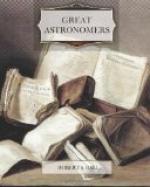But the end was approaching—the great philosopher, was attacked by low fever, from which he died on the 8th January, 1643.
KEPLER.
While the illustrious astronomer, Tycho Brahe, lay on his death-bed, he had an interview which must ever rank as one of the important incidents in the history of science. The life of Tycho had been passed, as we have seen, in the accumulation of vast stores of careful observations of the positions of the heavenly bodies. It was not given to him to deduce from his splendid work the results to which they were destined to lead. It was reserved for another astronomer to distil, so to speak, from the volumes in which Tycho’s figures were recorded, the great truths of the universe which those figures contained. Tycho felt that his work required an interpreter, and he recognised in the genius of a young man with whom he was acquainted the agent by whom the world was to be taught some of the great truths of nature. To the bedside of the great Danish astronomer the youthful philosopher was summoned, and with his last breath Tycho besought of him to spare no labour in the performance of those calculations, by which alone the secrets of the movements of the heavens could be revealed. The solemn trust thus imposed was duly accepted, and the man who accepted it bore the immortal name of Kepler.
Kepler was born on the 27th December, 1571, at Weil, in the Duchy of Wurtemberg. It would seem that the circumstances of his childhood must have been singularly unhappy. His father, sprung from a well-connected family, was but a shiftless and idle adventurer; nor was the great astronomer much more fortunate in his other parent. His mother was an ignorant and ill-tempered woman; indeed, the ill-assorted union came to an abrupt end through the desertion of the wife by her husband when their eldest son John, the hero of our present sketch, was eighteen years old. The childhood of this lad, destined for such fame, was still further embittered by the circumstance that when he was four years old he had a severe attack of small-pox. Not only was his eyesight permanently injured, but even his constitution appears to have been much weakened by this terrible malady.
It seems, however, that the bodily infirmities of young John Kepler were the immediate cause of his attention being directed to the pursuit of knowledge. Had the boy been fitted like other boys for ordinary manual work, there can be hardly any doubt that to manual work his life must have been devoted. But, though his body was feeble, he soon gave indications of the possession of considerable mental power. It was accordingly thought that a suitable sphere for his talents might be found in the Church which, in those days, was almost the only profession that afforded an opening for an intellectual career. We thus find that by the time John Kepler was seventeen years old he had attained a sufficient standard of knowledge to entitle him to admission on the foundation of the University at Tubingen.




